Narrated by photos:
Military Training Course during Sacred Defense
Elham Saleh
Translated by: Fazel Shizard
2018-10-31
Amirali Javadian has started photography in Art Center since 1978. He went to the sacred defense's fronts in 1981 to photograph. At that time, he was the photographer- correspondent for News Agency of the Islamic Republic of Iran and continued until 1986. Javadian entered into the university after the years of imposed war by Saddam Hussein against the Islamic Republic of Iran, and received his doctoral degree from the collage of Fine Arts in 2004.
The photos chosen from the works of Amirali Javadian and will be shown below focus on military training during the sacred defense. At that time, the militant training of volunteers began from the mosques; they receive military training at the mosques and special places.
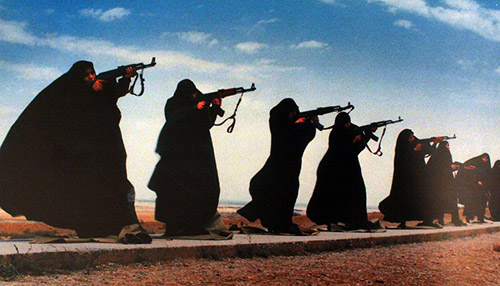
►Eight people; eight women. They want to shoot carefully. Here is rifle range, and women are being trained to shoot. Blue sky and white clouds show that it is a good weather for shooting. Each of them has a carpet piece underneath to kneel down, or even take some rest. They are ready to fight for Iran.
► Two persons; both of them have gun on shoulders. One who runs down a slope while both hands are full, and she is walking behind. Chitgar rifle range is the training place. They are wearing same uniform; grey or green mantle and both have tent, but they go down the slope quickly neglecting their clothes to be dirty in dust.
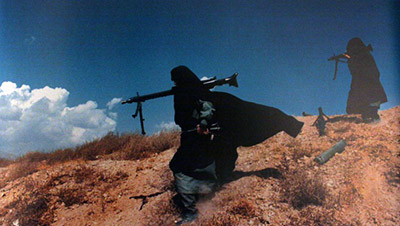
►All are young, but they are eager to defend the homeland. They must first receive training to be ready for fighting. They carefully look at what the trainer trains. These boys were only part of our groups who received military training by Bassij[1]
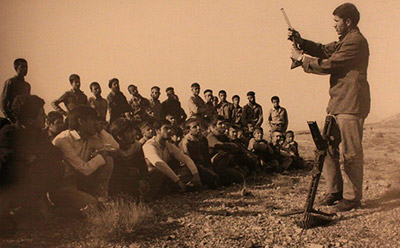
►Fighting is not just taking a weapon in hand; they should learn many things in Basij, such as crossing obstacles and heights. These three young people are also taking training course, while Iranian flag is fluttering in an airflow at the corner of the photo.

► A young girl who has come to receive military training to defend the country if needed. There is a sentence written on the wall behind him "The Islamic state must be military one." It is one of sentence of Imam Khomeini, dated Azar 1358 (December 1979).
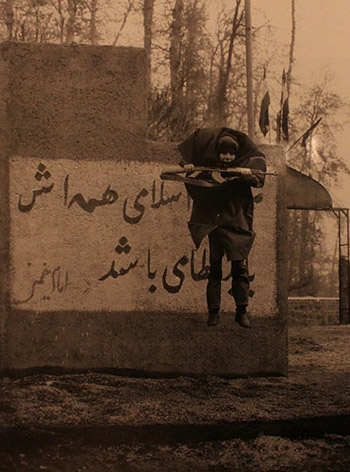
► Ladies endure all the hardships of military training, just like these women (in the photo) who take guns in their hands and creeping. Both are staring at the ground as if they shrank from a look at the camera of the photographer, maybe they are still busy with training forgot his presence.
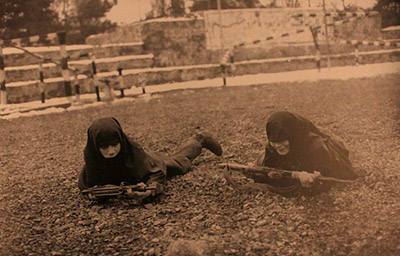
Source:
Permanent Frames 3: the Selection of sacred Defense's photos (photos by Amirali Javadian) / The Foundation for the Protection of Works and the Publishing of Sacred Defense Values
Number of Visits: 6631








The latest
- Third Regiment: Memoirs of an Iraqi Prisoner of War Doctor – 5
- 100 Questions/ 4
- An Sooye Divar (Beyond the Wall)
- From Nowhere-Land to Utopia
- Unveiling of the book: “Oral History: What and Why” — Report 2 (Final)
- Comparing the Narratives of Commanders and Ordinary Combatants in the Sacred Defense
- Third Regiment: Memoirs of an Iraqi Prisoner of War Doctor – 4
- 100 Questions/ 3
Most visited
- Oral History News in September & October 2025
- Unveiling of the book "Oral History: What and Why"
- Report on the unveiling of the book "Sangar-e Towfiq"
- 100 Questions/ 3
- Third Regiment: Memoirs of an Iraqi Prisoner of War Doctor – 4
- Comparing the Narratives of Commanders and Ordinary Combatants in the Sacred Defense
- Unveiling of the book: “Oral History: What and Why” — Report 2 (Final)
- From Nowhere-Land to Utopia
From Javanrud to Piranshahr
The Memoir of Reza MohammadiniaThe book From Javanrud to Piranshahr recounts the life and struggles of Commander Reza Mohammadinia, who spent part of the Iran–Iraq War in the western and northwestern regions of the country. During those years, he held responsibilities such as deputy commander of the Seventh Region of the Islamic Revolutionary Guard Corps (IRGC), acting head of the Javanrud district, service on the southern fronts, director of ...
Tactical and Strategic Analysis and Limitations
The present paper, entitled “A Critical and Scholarly Study of Dr. Hossein Alaei’s Two-Volume Book: Tactical and Strategic Analysis and Limitations”, is a research work that examines and evaluates the two-volume book “An Analytical History of the Iran-Iraq War”. In this study, the strengths and weaknesses of the work are analyzed from the perspectives of content critique, methodology, and sources.Clarifying the Current Situation; Perspectives of the Oral History Website
The definition of a “journalist” and the profession of “journalism” is not limited to simply “gathering,” “editing,” and “publishing breaking news.” Such an approach aligns more with the work done in news agencies and news websites. But now, after years of working in the field of books for various news agencies, newspapers, and magazines, when I look back, I realize that producing and compiling content for ...

